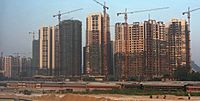
Photo from wikipedia
This is the first attempt to explore linkages among industrialization, urbanization, energy consumption, CO2 emissions, and economic growth based on estimations in simultaneous equations framework. An economic growth model is… Click to show full abstract
This is the first attempt to explore linkages among industrialization, urbanization, energy consumption, CO2 emissions, and economic growth based on estimations in simultaneous equations framework. An economic growth model is extended to incorporate industrialization as shift factor and pollutant emissions as determinant of total factor productivity. A country panel of 30 Chinese provinces/cities and three regional panels, for periods 2000–2016, are estimated employing Augmented Mean Group (AMG) estimator as well as Common Correlated Effects Mean Group (CCEMG) estimator that are robust to both cross-sectional dependence and cointegration. The empirical findings are as follows: (i) the impact of urbanization on economic growth varied from negative to neutral to positive for western-, intermediate-, and eastern-economic zone, respectively, and is known as “urbanization ladder effect,” (ii) moving from western to eastern economic zone, as regions develop, industry expansion has more powerful impact on economic growth, and thus, we define it as “industry expansion effect,” (iii) industrialization promotes rapid urbanization in less developed and less employment saturated regions; hence, we name it as “employment saturation effect,” (iv) economic growth in more developed regions pulled the CO2 emissions downward, while pushed it upward in case of less developed regions; therefore, we call it “growth pull/push effect,” and (v) in bidirectional causality between energy consumption and economic growth, the “feedback effect” of economic growth remained dominant for all four panels. Based on empirical findings, policies are suggested for Chinese economy. Further, these policies have potential to extract implications for the rest of the world.
Journal Title: Environmental Science and Pollution Research
Year Published: 2018
Link to full text (if available)
Share on Social Media: Sign Up to like & get
recommendations!